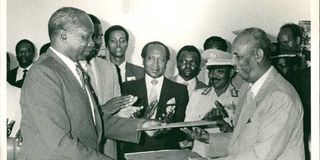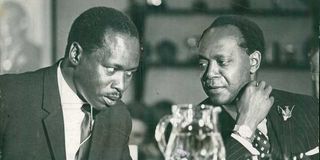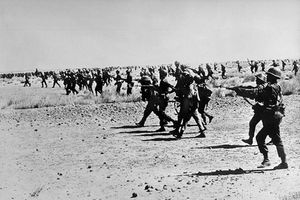
President Daniel Moi and Somalia's Said Barre exchange copies of an MoU on economic and technical cooperation in 1984.
Before a US-brokered truce took effect, as missiles and bombs lit up the skylines over Iran and Israel, Africa could only watch from a distance as global powers waded into the conflict to exert their influence.
This was first because the continent is so balkanised to have any meaningful voice in global peace effort. Second, countries are careful not to antagonise diplomatic and trade ties they have with the two countries.
Iran, for instance, is a key market for Kenya’s tea, goat meat and coffee while Kenya imports from Iran asphalt mixtures, petroleum coke and pasta. On the other hand, Kenya has a strategic partnership with Israel that covers trade, security and agriculture. However, the ties between Kenya and these two countries have never been free from tensions and intrigues especially during the Cold War, according to documents archived analysed by the Weekly Review.
Kenya-Iran relations nosedived in 1978, after the government in Tehran, under the leadership of Shah Mohammad Reza Pahlavi, cut off diplomatic relations with Kenya and recalled its ambassador. This was after Kenya criticised Iran’s policy in Somalia. Iran, in a bid to expand its influence in the Horn of Africa, had thrown its weight behind the government of Siad Barre, with the Shah warning that, “Iran would not stand by if the Ethiopians were to cross into Somali territory”.
By then Somalia was engaged in a cross-border conflict with Ethiopia over control of the Ogaden region and was also eyeing the North Eastern part of Kenya in pursuit of its policy of greater Somalia. Facing a common enemy, both Ethiopia and Kenya had signed a deal to come to each other’s rescue in case of an attack by Somalia.
Therefore, the announcement by the Shah that Iran would intervene in case Ethiopia invaded Somalia boded ill for Kenyans, who had already started suspecting that Iran was supplying weapons to Siad Barre. Consequently, in mid-February 1978, the then Kenyan minister for Foreign Affairs Dr Munyua Waiyaki, during a television interview, made some remarks that were critical of Iran, provoking a diplomatic tiff.
Almost immediately, Tehran issued orders recalling its envoy and closing its embassy in Nairobi. Iran requested the British High Commission if it could handle some of its consular services.
“The Iranians asked if we would accept responsibility for Iranian interests in Kenya and offered one Iranian officer to do essential work under our aegis. We agreed to accept this role on Iranians behalf,” read a letter marked “Confidential” and written by the Foreign and Commonwealth Office in London. The Iranian government at the time, which was later overthrown in a February 1979 Islamic revolution, was allied to the Western powers.
The move by Iran to sever diplomatic ties with Kenya caught senior officials in the Jomo Kenyatta government by surprise. Iran was a major source of Kenyan oil and officials were worried about the impact of the standoff on fuel prices. On February 18, 1978, Mr Ahmad Tavakoli, the then Iranian Ambassador to Kenya, visited the Ministry of Foreign Affairs to deliver the formal message about Iran’s decision.
James Osogo, who was acting as the minister for Foreign Affairs in the absence of Waiyaki, gave him a message from Mzee Jomo Kenyatta in which the President stated that he personally attached importance to Kenya’s relations with Iran and that he was unaware of Waiyaki’s statement.

Daniel arap Moi (left) and Charles Mugane Njonjo.
Meanwhile, efforts were also being led by Vice-President Daniel Arap Moi and Charles Njonjo for European countries with great influence over the Iranian government to intervene and help Kenya restore its diplomatic relations with Tehran. In this regard, on February 25, 1978, the two held a meeting with a senior British diplomat Robin Byatt and raised with him the question of Kenya-Iran relations. Documents indicate that during the meeting that was held at Jomo Kenyatta International Airport, Njonjo told the British diplomat that Kenya had no intentions to break with Iran, adding that even though Waiyaki went too far in his criticism of the Iranian government, the remarks by the Foreign minister had been exaggerated by the international press.
On February 28, 1978, while transiting through London on their way to Washington, the two influential officials from Nairobi requested the British Foreign Office to help Kenya send a delegation to Tehran to patch up things with the Iranians.
“The Vice-President (Mr Moi) and Attorney General (Mr Njonjo) have told us in London on their way to Washington, that they want to restore the position, and would like to send a high-level mission to Tehran very soon, possibly led by the Vice-President, to clear-up the position,” read a document from the Foreign Office seen by the Weekly Review.
The document added: “We want to help restore the position between these two countries, particularly as both have turned to us for a measure of assistance. Instructions are accordingly being sent to HM (Her Majesty) Ambassador to Tehran asking him to convey the Kenyan message about a visit and to do what he can urge the Iranians not to act in precipitate fashion in closing their mission, as we believe the Kenyans genuinely want to restore good relations with Iran.”
Meanwhile, Kenya officials had also reached out to Belgium to help them mend relations with Iran. A message sent by the Ministry of Foreign Affairs to the Belgian diplomat in Tehran to deliver to the Iranian government read; “The government of Kenya request the imperial government of Iran to delay the departure of its ambassador from Nairobi. The government of Kenya wished the opportunity to clarify the misunderstandings which had arisen between the two governments and therefore intended to send the vice president of Kenya to Tehran. The aim of this visit would be to clear up the misunderstandings which had arisen and to give the necessary explanation.”
Although the Belgian ambassador delivered this message to the Iranian ministry of Foreign Affairs, it was later made clear to him that the appropriate channel for further communication would be the UK government.
But it appeared the more Kenya displayed its desperation, the more Iranians hardened their stance. Initially, they had agreed to leave one consular officer in Nairobi, but later decided to cut diplomatic ties completely.
“The Iranians are now talking in terms of a complete severance of relations. So the situation is thoroughly confused,” wrote one British official in the confidential documents.
After great persuasion by the British, Shah Mohammad Reza Pahlavi finally agreed to meet a Kenyan delegation to solve the diplomatic standoff.
A correspondence from the British Foreign Office to this effect stated: “The Shah has agreed to receive a high level of Kenyan delegation in Tehran and to the establishment of an Iranian Interests Section in Nairobi under our aegis. This is encouraging. Delay in transmitting the Shah’s response to the Kenyans risk allowing complications to set in. It would be better not to wait until the Kenyans come here next week, but instruct Washington to speak to the Kenyans.”
*
In Part 2 next week: How Kenya-Israel ties have evolved over the years
The writer is a London-based Kenyan journalist and researcher







